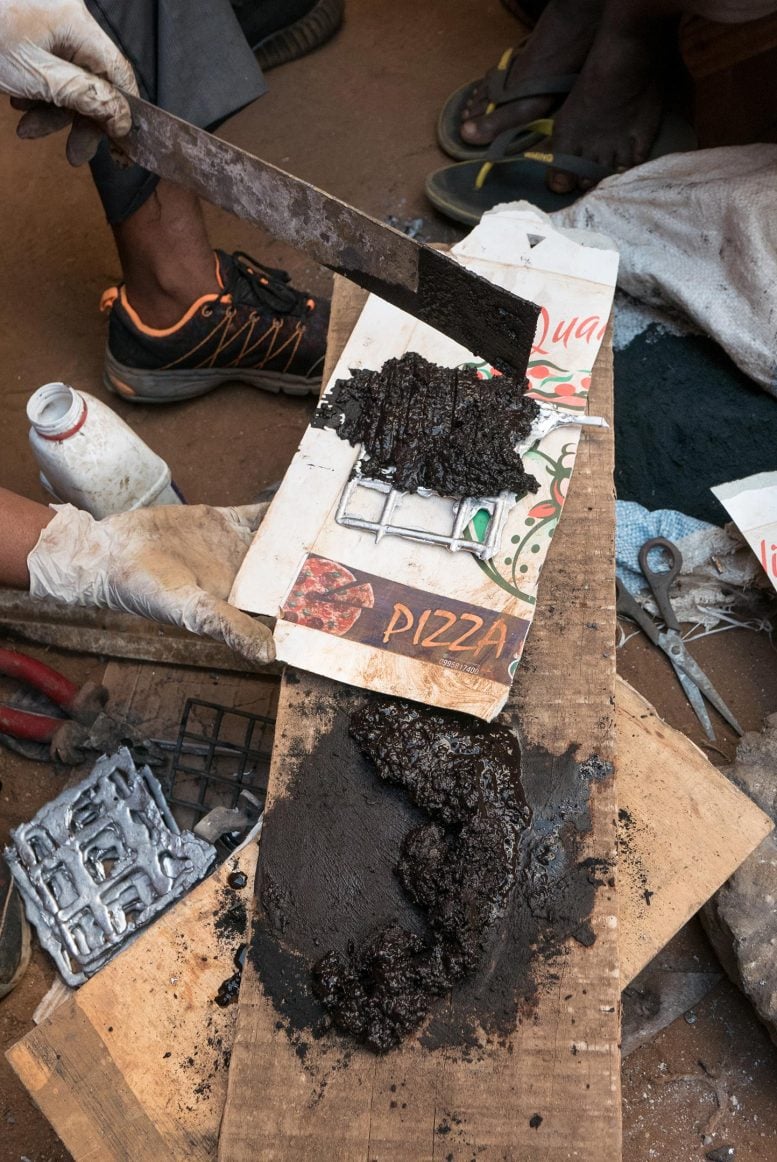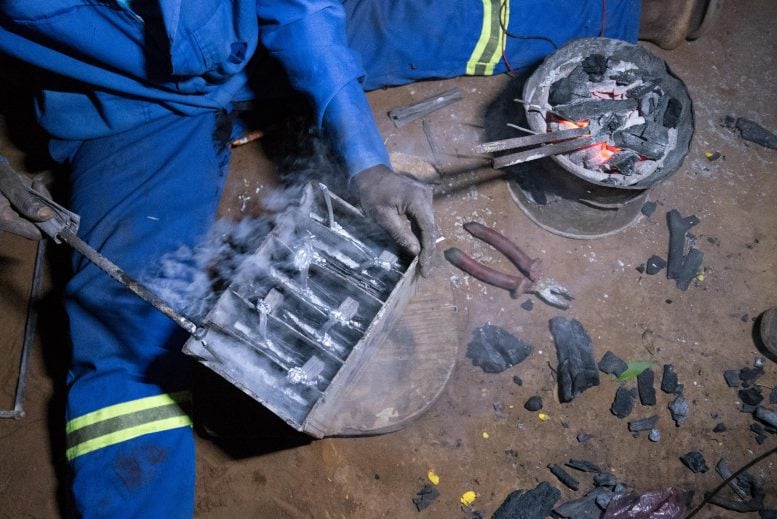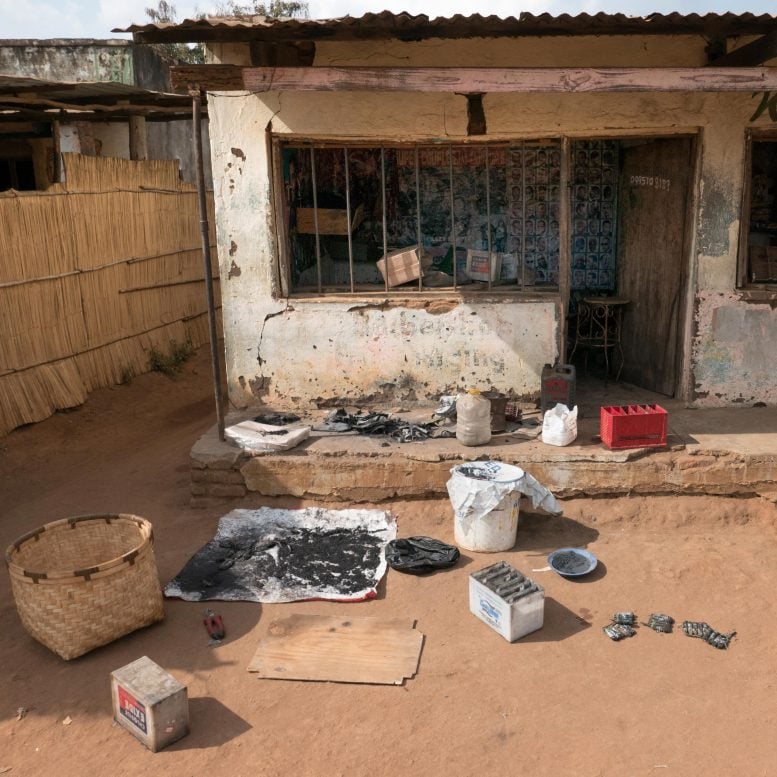
Posted on 08/20/2024 4:47:26 AM PDT by Red Badger

Recycling activities for lead-acid batteries. Credit: Dr. Chris Kinally
~~~~~~~~~~~~~~~~~~~~~~~~~~~~~~~~~~~~~~~~~~~~~~~~~~~~~~~~~~~~~~~~~~~~~~~~~~~~
New research exposes dangerous lead levels from Malawi’s informal solar battery recycling, calling for urgent waste management reforms.
Researchers at The University of Manchester have identified dangerous levels of lead pollution in Malawi due to informal recycling of lead-acid batteries from off-grid solar systems. Common informal recycling activities for lead-acid batteries used in solar energy systems were recorded to release 3.5-4.7 kg of lead pollution from a typical battery, equivalent to more than 100 times the lethal oral dose of lead for an adult. These findings were recently published in the journal Applied Energy.
Growing Demand and Risks of Off-Grid Solar Power
Off-grid solar technologies are used to provide power to areas lacking traditional grid connections and are crucial for expanding electricity access across sub-Saharan Africa. The private market for off-grid solar electrification technologies is expected to provide electricity access to hundreds of millions of people by 2030, subsidized by global energy companies in the Global North, including the UK. In sub-Saharan Africa, household-scale off-grid solar energy systems mostly depend on lead-acid batteries as the most affordable and established energy storage technology.
However, the scientists warn that the absence of formal waste management infrastructure presents major human health and environmental risks and requires immediate government intervention.

Recycling activities for lead-acid batteries. Credit: Dr. Chris Kinally
~~~~~~~~~~~~~~~~~~~~~~~~~~~~~~~~~~~~~~~~~~~~~~~~~~~~~~~~~~~~~~~~~~~~~~~~~~~~~~~~~
“The private market for off-grid solar products is a very effective way to increase access to electricity, which is crucial for sustainable development. However, the resulting toxic waste flow is growing rapidly across regions that do not have the infrastructure to safely manage electronic waste,” said lead researcher Dr. Christopher Kinally, who conducted the study for his PhD at The University of Manchester.
“Without developing infrastructure, legislation and education around these technologies, there are severe public health risks. Significant social, economic and legislative interventions are required for these solar products to be considered as a safe, low-carbon technology in sub-Saharan Africa.”
Urgent Need for Sustainable Waste Practices
Toxic informal waste management practices are known to be common for automotive batteries and electronic waste in low- and middle-income countries, but the environmental and health impacts of these practices have been widely overlooked. Now, efforts to promote sustainable development and electricity access are adding to these life-threatening waste streams.
Kinally recorded that within suburban communities in Malawi, lead-acid batteries from solar energy systems are being refurbished openly on busy market streets by self-taught technicians, who are unaware of the toxicity of the materials they are handling.

Recycling activities for lead-acid batteries. Credit: Dr. Chris Kinally
~~~~~~~~~~~~~~~~~~~~~~~~~~~~~~~~~~~~~~~~~~~~~~~~~~~~~~~~~~~~~~~~~~~~~~~~~~~~~~~~
He found that batteries are broken open with machetes, lead is melted over charcoal cooking stoves, and improvised lead battery cells are made by hand. In the process, approximately half of the lead content from each battery is leaked into the surrounding environment, releasing the equivalent of more than 100 lethal oral lead doses from a single battery into densely populated communities.
This is the first data to quantify lead pollution from the informal recycling of lead-acid batteries from solar energy systems.
Dr. Alejandro Gallego Schmid, primary supervisor of the PhD and Senior Lecturer in Circular Economy and Life Cycle Sustainability Assessment at The University of Manchester, added: “The problem is not the use a renewable source like solar energy, but the lack of appropriate treatment of the batteries at the end of life. We urgently need further research to reveal the health impacts of the identified flows of toxic pollution from solar batteries.”
Consequences of Lead Pollution and the Need for Policy Intervention
Lead is a potent neurotoxin, and very low levels of lead exposure can permanently impact a child’s brain development. UNICEF has estimated that 800 million children across low- and middle-income countries have lead poisoning. This widespread lead pollution is largely driven by improperly managed automotive battery waste and is expected to have substantial health and economic impacts across the Global South yet continues to be overlooked.
Prior publications from the research team also highlight that the private off-grid solar market suffers from a general lack of supplier accountability and substandard, short-lived, and counterfeit off-grid solar products were found to be common in Malawi, exploiting vulnerable energy-poor populations.
A lack of education about how to build and use these solar energy systems, which are particularly vulnerable to damage from improper use, is also severely limiting the lifetimes of batteries in off-grid solar energy systems.
Batteries in Malawi were recorded to often fail within a year, far shorter than the 3-5 year expected lifetime, accelerating the toxic waste flow. Meanwhile, the environmental impacts (including carbon emissions) from manufacturing and replacing short-lived lead-acid batteries are compromising the sustainability and environmental benefits of solar energy systems.
Dr. Fernando Antoñanzas, co-supervisor of the PhD, added: “This study brings more light on the maintenance and end-of-life phases of small off-grid solar projects, indeed left unattended in most cooperation projects. While informal lead-acid battery recycling offers a short-term solution for electrification for the poorest, at the same time, represents an enormous public health risk across Sub-Saharan Africa.”
The research team has also provided policy recommendations for waste management solutions, including changes to how solar energy companies receive investments from the UK and Global North.
Reference:
“Life cycle assessment of solar home system informal waste management practices in Malawi” by Christopher Kinally, Fernando Antonanzas-Torres, Frank Podd and Alejandro Gallego-Schmid, 16 April 2024, Applied Energy.
DOI: 10.1016/j.apenergy.2024.123190
This research was funded by EPSRC.
Racist leftist environmentalists believe the lives of these people hacking open batteries with machetes are worth far less than the life of a Spiny Mottled Bush Cricket.
Where did this occur?
I once tried getting lead out of a lead acid battery - no luck. The lead is embedded in the plates with other materials. I can see why trying to recover it is dangerous, especially when done in those conditions.
As it is, Lithium Ion batteries now cost no more than Lead Acid batteries, so no need to deal with the lead...but, of course, plenty more to deal with when it comes to Lithium Ions.
White western environazis do not concern themselves with the plight of the victims of their environazism. It is about the feelz man. If some little African kids have to work as forced slaves breathing in toxic fumes so Al Gore can buy carbon credits and sleep well in his mansions so be it. There is a planet to save and the Africans are just eggs for the omelet. Greta will be proud of their sacrifice.
but but but GREEN ENERGY
Green energy for me, but lead poisoning and cancer for thee!.............
The lefts dream is harming poor people. Again.
3.5 to 5.7 kilograms of lead is 10 to 15 pounds! The lethal dose delivered at 30 meters per second ( I made that up ) is a couple of grams. Lead poisoning is serious stuff and I think they mean milligrams when discussing lethal doses for adults. Another thing is that lead is nearly impossible to get rid of once it gets into the body. There is no nutritional value to lead and no natural mechanism for eliminating it.
A paper from this year...
Boy, does that open one mother of a can of worms...
Disclaimer: Opinions posted on Free Republic are those of the individual posters and do not necessarily represent the opinion of Free Republic or its management. All materials posted herein are protected by copyright law and the exemption for fair use of copyrighted works.